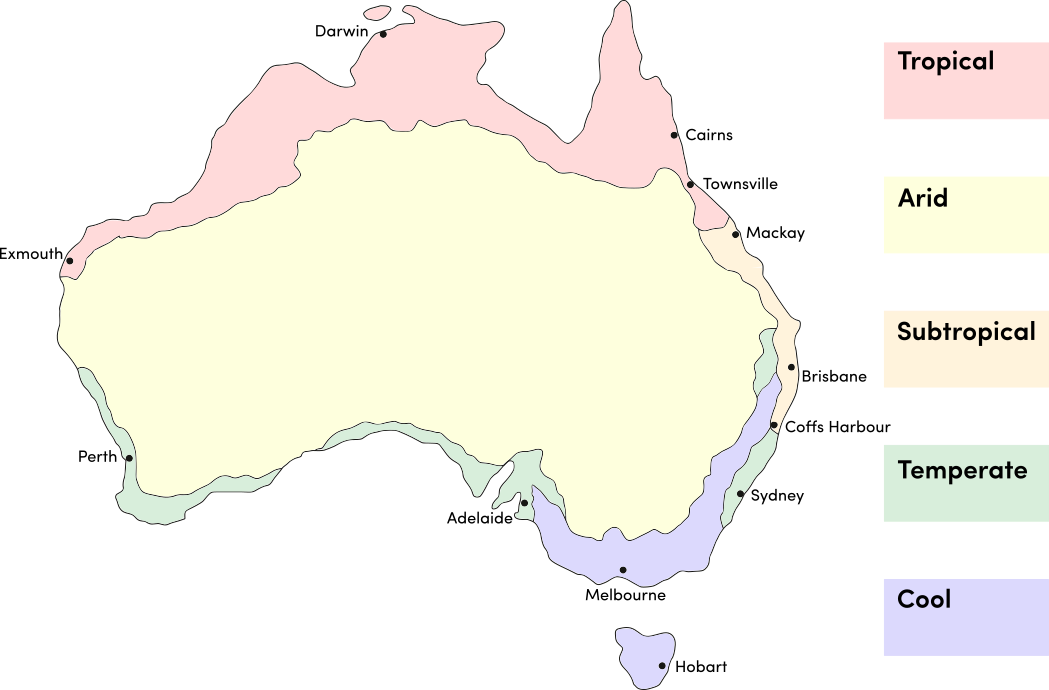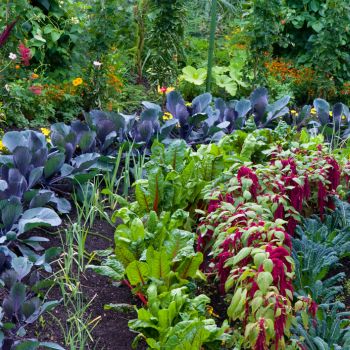The text below was taken from our December 2017 email newsletter. If you'd like to subscribe and get tips like this sent directly to your inbox please click here.
Seeds to sow in December
There are plenty of herbs, vegetable and flowers that can be planted thoughout early summer, click the links below to see a list of varieties suitable for sowing in your climate:
| Cold Climate: Tasmania, Melbourne, Mt Gambier, Canberra, Toowoomba, etc. |
| Moderate Climate: Sydney, Perth, Adelaide, etc. |
| Warm Climate: Brisbane, Bundaburg, Carnavon, etc. |
| Tropical Climate: Broome, Darwin, Cairns, Townville, etc. |
Not sure which climate? Click here.
Watering and Mulching
With this current run of hot weather it is critical that plants get sufficient water. There are a number of ways we can use less water and keep our plants hydrated:
- Water early in the day. This allows the plants to take up water before the heat of the day. Watering at night is better than no water but increases the risk of mildew problems during the warmer humid nights.
- Don’t use overhead sprinklers unless you have to. Sprinklers waste a lot of water as it can blow away or evaporate with the slightest breeze. Wet leaves are also susceptible to fungal problems. Coverage can also be excessive, ie: water reaching areas where there are no plants.
- Water at the roots. This will provide water where it’s needed with much less waste. Use a drip system, a hose, or a watering can minus the rose to direct the water
- Make small ‘wells’ around individual plants like tomatoes. Zucchinis, pumpkins, etc. to minimise run-off
- Give your plants a good soaking. This will make stronger plants with deeper roots. Shallow watering will cause roots to concentrate near the surface and they will be more vulnerable in the heat and in drier spells.
- Mulch. Using mulch around your plants will conserve a lot of water and also keep the roots cooler. Use anything you can: sugar cane mulch, grass clippings, boards each side of a row, stones, leaves, newspaper held down with stones, etc.
Planting
Seedlings and young plants are particularly susceptible to hot weather, especially when planting out into the garden. The steps below will help give your seedings the best chance possible:
- Transplant new seedlings in the evening or when it is cool and overcast. This will reduce transplant shock and give the seedlings a much better chance.
- Keep de-potted seedlings under a damp towel during planting to prevent drying out.
- Have a watering can or bottle on hand and water each plant as you plant it. This will stop the fine little roots from drying out.
- Mulch around your seedlings to conserve water.
- If the heat is intense put a few sticks around your new plants and drape some shade cloth over them to further protect them for the first few days.
You should also keep in mind any seedlings/plants you have growing in hot houses which can quickly turn into ovens on hot days. Make sure they are well ventilated or risk cooking your seedlings!
Pests
With the warmer weather pests may be having a bonanza with your plants. Carefully monitor your plants and try to remove pests as they occur. Small infestations can normally be removed by hand but larger infestations may need controlling with a dust or spray. Avoid resorting to chemicals wherever possible as there is a good range of safer sprays and dusts that can be made at home or purchased from your local nursery.
Growing shrubs and ‘daisy’ flowered plants (such as Calendulas, Marigolds or Zinnias) in and around your garden will provide habitat and food for small birds, small lizards and predatory insects who will happily munch on your pests.
General
- Keep weeds under control. Weeds will complete for resources such as sunlight, water and nutrients and slow down the growth of the rest of your garden.
- Pick vegetables regularly to encourage more fruit and faster growth.
- Deadhead and compost spent flowers. Removing faded flowers will encourage the plant to produce new growth and further flowering rather than putting all it's energy into seed heads.
- The most important advice I can give you this month is to take the time to sit back and enjoy your garden while it's thriving in the warmer weather. Watching your seeds sprout, your plants unfold and your garden develop is one of the great joys of being a gardener...savor it!





